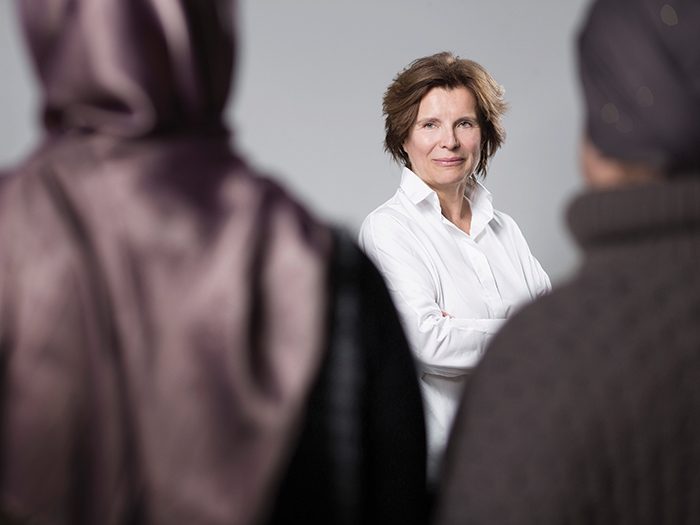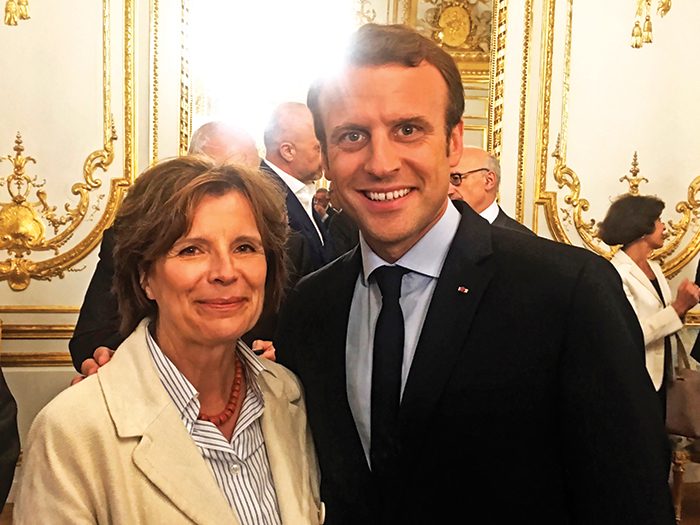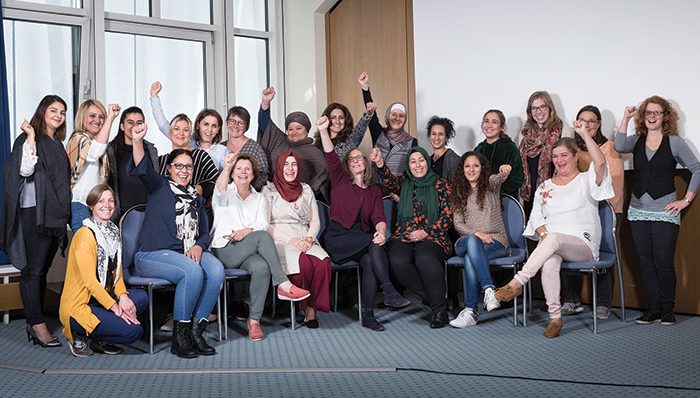Mother Power
Mothers are on the frontline against terror. So says Edit Schlaffer who works tirelessly to help women around the world identify and tackle signs of extremism in their children. In recognition, she receives the Reader’s Digest European of the Year award for 2018.

Luton, England, May 2016
“I couldn’t believe my son had gone to Syria. I didn’t know how to deal with it. I was angry inside—angry with those who had brainwashed him.” Khadijah Kamara, 37, is talking to a group of 40 mothers about 19-year-old Ibrahim, the eldest of her four teenage sons, who went to fight with extremists in Syria. He was killed in an air raid in September 2014.
The mothers, mostly of Bangladeshi, Pakistani and Somali origin, are beginning a free 10-week training program in a community center in the English town of Luton, close to London. The room is often used for keep-fit classes, but today’s lesson is altogether more serious.
It is a striking scene. Kamara, originally from Sierra Leone, her head and neck covered in a hijab, gazes out over a sea of colorful headscarves, saris and shalwar kameez.
She tells the women about her “loving and respectful boy”, who had wanted to become an engineer but was recruited to jihad. “My son has died and up to this day I cannot explain,” says Kamara.
The mothers listen intently. There are tears as Kamara says she discovered from another jihadi fighter that Ibrahim had been trying to contact her from Syria just before he died.
Sitting next to Kamara is Austrian sociologist Dr. Edit Schlaffer, who has flown in from Vienna to meet the mothers. Schlaffer is the creator of this ground-breaking program, called MotherSchools. Its purpose is simple and ambitious: to equip mothers to build their children’s resilience against recruitment by extremists, and to intervene when they recognize signs of radicalization.
Part of a global initiative, the course is being held in Luton for good reason. The town has frequently been linked to terrorism and has been dubbed a “hotbed of Islamist extremism” in the U.K. media.
Since November 2015 there have been seven major terrorist attacks in Britain, France, Belgium, Germany and Spain, claiming 329 lives and injuring 1,648. The perpetrators have often been home-grown jihadis, many inspired by Islamist propaganda and extremists on social media sites.
Over the ensuing weeks the Luton mothers will learn through role play and confidence-building exercises how to communicate better with their children, how to observe their psychological development, monitor their use of the Internet and recognize warning signs. The aim is to help the mothers develop resilience and build it in their children, families and communities.
Many of those in the room live in male-dominated households and rarely leave home beyond taking their children to school.
“Mothers have heard of radicalization,” says 74-year-old Bangladeshi-born Nazia Khanum, an expert on gender issues, forced marriage and community empowerment, who runs the MotherSchools course. “But they don’t know what it means. Tied to home, they feel isolated and terrified of the Internet. Edit helps them to end that isolation and to regain a connection with their children.”
Both she and Schlaffer have seen how terrorist recruiters continue to corrupt Europe’s alienated, jobless youth. More than 4,000 young Muslims have left Europe to fight in Syria and Iraq. “We have to bring sense into the world and we must start with our children,” says Schlaffer. “Mothers will make the world safe for us all.”
The Luton mothers will be among the first in Europe to graduate. She tells them: “You can be a new army—without weapons, but with words.”

Crossing Continents
Schlaffer is the mother of two grown-up children and married to a professor of psychology. She is 67 but looks a decade younger, which is remarkable, given her punishing schedule.
In just one six-week period last autumn, for instance, she spent seven days visiting MotherSchools in Jordan, returned home to Vienna for two days before heading to Paris to speak at a global forum hosted by President Macron and flew on to Washington DC to speak at the American University. Days later she was spreading her message as a delegate at the 72nd Session of the UN General Assembly.
Her commitment reflects determination and strength. “Hope in these dark times and a sense of adventure and empowerment is what drives me on,” she says. “Why stay at home watching TV and feeling helpless?”
Schlaffer describes her childhood as “uneventful, peaceful and laid-back”, if not entirely conventional. Born in 1950 to middle-class professional parents, she spent the first six years of her life on her grandmother’s farm in eastern Austria, meters from Soviet-occupied Hungary.
“My friends and I would play under the eyes of a Russian soldier in his watchtower. My parents would tell me how lucky I was to be on this side of the fence.”
She discovered activism as a sociology student at Vienna University and had ambitions to become a foreign correspondent. But the offer of a research job led her towards a career as an academic. In the 1980s, as a sociology lecturer at the university, her research took her into the field.
She first worked with refugees—mainly traumatized women and children—from the Bosnian conflict. “I knew we were witnessing living history and I had to document it,” she says.
Her work in the 1990s would also take her to Pakistan, where she met women and children fleeing war in neighboring Afghanistan. There, she got to know a group of women who risked their lives to cross the lawless border into Pakistan, bringing out video evidence of fundamentalist brutality and executions.
“I have this vivid picture of their floating burqas as these brave women made their perilous journey,” she says.
The experience inspired her to launch Women without Borders (WwB) in 2001, with the goal of empowering women as agents of change. The NGO’s projects have included the first anti-extremist hotline in Yemen, empowerment strategies for girls in Rwanda and a women’s center in Afghanistan.
Then, in 2008, WwB launched SAVE, Sisters Against Violent Extremism, a female counter-terrorism platform that aims to unite women around the world. “We have to stand up for ourselves and for each other. Times of crisis are also times of opportunity,” says Schlaffer.
Khujand, Tajikistan, 2012
Four years later, Edit Schlaffer and a group of Tajik mothers are gathered in a sparsely furnished room at a small community center in Tajikistan’s second city. She is part of a mission, funded by the Organization for Security and Cooperation in Europe, to discuss increasing radicalization in the country. There is just a single small stove to ward off the mountain cold, but the shivering women are eager to talk.
“They were alarmed that their children were dropping out of school and being drawn to mosques funded by Saudi Arabia, where they were being taught an extremist interpretation of Islam. They felt powerless to intervene,” says Schlaffer.
“I said, ‘Can’t you talk to them?’ They replied that their sons were no longer boys, they were men—and that made it very difficult to challenge them. Some of these ‘men’ were just 12 years old, but they wanted to talk tough and be heroes. The women were trying to care for their children, but another influence had created a distance between them.”
Suddenly, Schlaffer had a lightbulb moment. “I can still see Rosaria, a mother of four in her mid-forties, in front of me. She had a wonderful smile. She said, ‘We mothers have to go back to school.’
“That was the moment that MotherSchools was born in my mind. I realized that it is mothers who are on the frontline against terror. We have to equip them with not only the confidence but also the right tools and techniques to interact better with their children.”
Schlaffer won funding to develop her ideas and a curriculum. She and her team researched exhaustively, interviewing a thousand mothers of adolescents in areas of historic conflict, including Northern Ireland, the Palestinian territories, Pakistan and Nigeria. Many of the mothers identified an urgent need for practical opportunities and skills to respond to the risk of radicalization.
The first MotherSchools pilot opened in Tajikistan in February 2013. Others followed in Austria, Belgium, Germany, Macedonia, the United Kingdom and several non-European countries.

Würzburg, Bavaria, September 2017
Edit Schlaffer’s lightbulb idea is catching on fast. There are 22 women sitting in a circle as the sun filters through the windows at the Congress Centrum in Würzburg on the banks of the River Main. Famous for its baroque churches and vineyards, this peaceful corner of Germany seems a world away from Islamist terrorism.
Yet the previous year the country had suffered its first jihadist attack by an asylum seeker when a radicalized 17-year-old Afghan, armed with a knife and axe, attacked passengers on a train near the city.
The women, who hail from Turkey, Tunisia, Algeria and Syria, are social workers, teachers, translators, counselors and full-time mothers. They are about to be trained to launch and run MotherSchools in five separate locations in Bavaria.
The Bavarian government has asked Schlaffer to set up the schools as part of its radicalization prevention program. She may be a gifted enabler, but she knows it is only women from local communities who can effectively deliver the MotherSchools curriculum.
Schlaffer, wearing red sneakers and a flowing white shirt, starts proceedings with a challenge. “Each one of you is going to walk across the room,” she says.
There is reticence at first. It’s a daring test for the women, many of whom are used to playing a secondary role in their cultures. Then one young woman in jeans and black heels steps forward. She glides across the room. Her self-assertiveness inspires others to stand up. Soon the room is a colorful catwalk of elegant suits, jogging suits, sparkling trousers and headscarves. Cheers and laughter ring out.
This exercise leads to a discussion on how mothers send out signals to their children through their body language. “Children can read body language,” Schlaffer explains. “When we radiate self-confidence, so do they. Extremist recruiters are very warm and empathetic. They are also assertive, saying they will help young people to a better life. Mothers need to adopt those same approaches—but to a positive end. Making mothers strong starts with reinforcing the idea of how valuable they are, as mothers and as people.”
“If there is no prevention there is radicalization,” says Bouchra, a 46-year-old mother of five who will lead one of the Bavarian MotherSchools. “I came to learn. I want to do the right thing.”
Luton, September 2017
Back in the United Kingdom, 40-year-old Parveen is one of the latest graduates from the MotherSchools program in Luton. Born in Pakistan, she came to England 20 years ago. She has two teenage sons, aged 18 and 13.
“Before I did this course my eldest had stopped listening to me. I worried he was spending too much time on the computer,” she says. “The other mothers helped me re-learn how to talk to my children, how to avoid rows or silences. We have the computers downstairs in the sitting room and the family eats together rather than me being stuck in the kitchen.”
“I didn’t know what community meant,” she adds. “But now I have many friends and a part-time job as well. I feel as if I’m a mother bird who has learned to fly out into the wider world.”
Her words are clear evidence of the difference that MotherSchools can make in increasing mothers’ self-confidence and social connectedness so that they can better safeguard their children. As Edit Schlaffer says, “When I see the warmth and confidence in our graduates I know they can confront extremism and violence by changing attitudes.”
With additional reporting by Isabelle de Pommereau
Reader’s Digest European of the Year Our annual award recognizes an exclusive group of Europeans whose extraordinary work helps to make the world a better place. Edit Schlaffer is the 23rd winner of this unique Reader’s Digest award.



